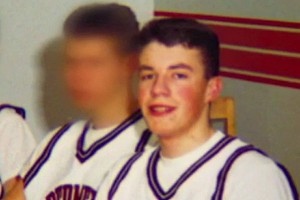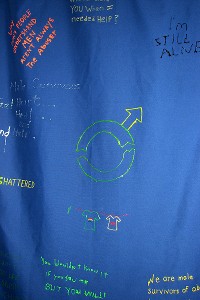SYRACUSE, N.Y. -- Margarine. The mere thought of it, even the word itself, for years sent Craig into dizzying tailspins. He could never understand why.
And then one day four years ago, a man knocked on his door and it all came flooding back, a lifetime of repressed memories so vile and sickening they literally imprisoned Craig in his house for two years.When he finally emerged again, it was on a stretcher. He'd tried to kill himself and only a chance 1 a.m. visit from his son stopped him from succeeding.It is now six months later and Craig is sitting at a square table at Vera House, a Syracuse-based outreach and advocacy center for victims of abuse.Three other men are with him. They, like Craig, were sexually abused as children -- Ed and Tim by their fathers, Dan by a neighborhood football coach.[+] Enlarge

courtesy Vera HouseVera House, an outreach and advocacy center for victims of sexual and domestic abuse, sits just a few miles from the Syracuse campus.
Dan didn't have the luxury of repressed memories.Molested by his football coach from the time he was 11 until he was 13, he carried the knowledge around like a two-ton albatross."I fully expected I would take it to my grave," he said. "I felt like my own life couldn't go on if I let my secret out. I didn't want to be stigmatized. I didn't think I could face my friends if they knew or society in general."Dan married, had a family and became, in his words, a "pretty good alcoholic." Eventually forced into marriage counseling by his wife, he finally spilled his secret when he was 38, telling his therapist what had happened to him as a child.It sounds inconceivable, to live with something so heavy and hurtful without screaming to authorities, to someone.And those questions -- Why wait? Why not say something? -- are often the first posed when someone like Fine's alleged accuser, Bobby Davis, comes forward later in life."I've been in recovery for close to 17 years and I probably know nearly 100 survivors and I don't think any of them are in their 20s or 30s," Dan said. "Everybody holds it in."That includes Dan, Ed, Tim and Craig.All were grown men before they sought help and admitted they were abused.
[+] Enlarge

ESPNBobby Davis, seen here as a youth basketball player, alleges that Bernie Fine sexually abused him.
When Ed was in elementary school, he finally worked up the courage to walk into his guidance counselor's office and say that his father was abusing him.His guidance counselor quickly shooed him out the door and never spoke of it again.Neither, really, did Ed until seven years ago when he first arrived at Vera House, instead suffering the abuse until he was 14 before freefalling as an adult into drugs and failed relationships.He's not angry with the guidance counselor, considering his inaction more indicative of the ignorance of the times than callousness.But now he sees less of an excuse for such insensitivity. Though we are still climbing the educational curve, there is clearly a more heightened awareness of the signs of abuse and an understanding that it does occur.And that's why Ed can't forgive Boeheim for his initial outburst. The day after Davis went public with his allegations against Fine, Boeheim labeled them a "bunch of a thousand lies," and said he believed Davis was only looking for money.Ed understands the coach needs to be educated, but he also knows the impact of words."How many people heard that and now are going to wait another 30 years before speaking?" he said. "I don't care about anything he said after that first reaction. I am sure there are people who were this close to talking and now they're this far away [spreading his arms wide]."And it's not just Boeheim. It's all of the public reactions at Penn State and Syracuse that have victimized people all over again. Randi Bregman, executive director of Vera House, said frequently when there is a national news story centered on abuse -- if a woman is killed in a domestic dispute, for example -- the program's hotline numbers spike significantly.
[+] Enlarge

Richard Mackson/US PresswireIn a college town like Syracuse, the words of a beloved figure such as Jim Boeheim are impactful and carry plenty of weight.
Tim was nearly 50 years old when he finally confronted his father, the man who had sexually, physically and psychologically assaulted him from the time he was 5 until he was 17."I was petrified," he said. "He just sat there with his eyes closed and I was terrified."The terror, the shame, all of it is never far from the surface."There is no cure," Tim said. "This isn't Dr. Phil."The reality is, there is only management. There are normal days that suddenly go haywire and quiet nights when childhood insecurities resurface."You sit there at 3 a.m. and you think about walking into a room, worry that people are thinking, 'Look at that schlep,'" Tim said. "You know they aren't in your heart, but it's still there."
“"Or," Dan added, "you think people who know are keeping their kids away from you."Not long ago, Tim said, he was passing through a metal detector at the New York state capitol. He went to get his change out of the bowl, tipping the bowl toward him. A security guard asked him not to tip it, but Tim didn't hear him and so the guard said it again, more forcefully."And I just cowered," Tim said. "There's this voice that sounds like my father and I'm suddenly in this infantile state. You don't know it's coming. There aren't any warnings."That's why he and the other three men laugh when people scoff at the timing of Davis' allegations, labeling the timing "convenient.""There is nothing convenient about this," Craig said.Instead they are certain that for Davis, the Penn State news served as a trigger, an out-of-nowhere reminder of what he had been through."I'm sure he's not alone," Dan said. "I think I'm pretty stable and yet for the past month all I've been able to think about is Penn State and Syracuse and Jerry Sandusky and Bernie Fine. What about these people still holding on to their secret? What are they doing? I'll tell you. They're drinking more. They're yelling more. They're fighting more because they can't get away from it."And they shouldn't try -- that's what these men want to stress.They want victims to know that they can get help privately, that they don't have to be like Davis and go to the media or even the police. They don't even need to share the name of their molester.They just need to get help."People don't realize how messed up they are," Craig said. "They don't realize how falsely they're living their lives. This affects everything you do and you don't even know it."There is no cure. This isn't Dr. Phil.”-- Tim, sexual abuse survivor
His friend gave him the analogy, but it's a good one and so Ed shares it with everyone.He likens his abuse to a rock in a pocket.
[+] Enlarge

courtesy Vera HouseA large banner with several heartfelt writings serves as a powerful symbol at Vera House.
No comments:
Post a Comment